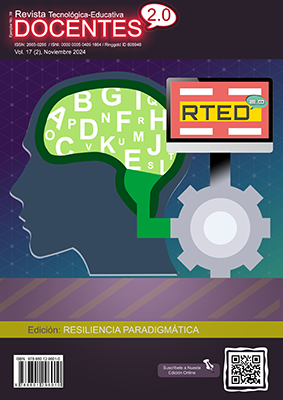Impact of a Textbook on the Learning of Spanish Literature: A Perspective from the University of Guyana
 DOI:
https://doi.org/10.37843/rted.v17i2.560
DOI:
https://doi.org/10.37843/rted.v17i2.560
Main Article Content
Abstract
The absence of a specially adapted textbook for the course “Introduction to Spanish Literature” at the University of Guyana represented major challenges for students. This research aimed to assess the impact of the book “Brief Introduction to Spanish Literature” on learning Spanish literature at that educational institution. The study was based on the positivist paradigm, using the deductive method and quantitative approach with a longitudinal experimental design. The sample consisted of five students who took the course for two consecutive academic years. A Likert scale survey and an eight-question questionnaire were used. The results highlighted the positive perception of the book’s link to the course program and its contribution to learning Spanish literature. The study emphasized the relevance of textbook design for linguistic and literary learning, underlining the need to improve textbook design to foster linguistic competence and literary appreciation at the University of Guyana.
Downloads
Metrics
Article Details

This work is licensed under a Creative Commons Attribution-NonCommercial-NoDerivatives 4.0 International License.
Those authors who have publications in our journal accept the following terms:
- When a work is accepted for publication, the author retains rights of reproduction, distribution of his/her article for exploitation in all countries of the world in the format provided by our magazine and any other magnetic medium, optical, and digital.
- Authors will retain their copyright and guarantee the journal the right first to publish their work, which will be simultaneously subject to the Creative Commons Acknowledgment License (Attribution-NonCommercial-NoDerivatives 4.0 International (CC BY-NC-ND 4.0)). That allows third parties to copy and redistribute the material in any medium or format, under the following conditions: Acknowledgment - You must properly acknowledge authorship, provide a link to the license, and indicate if any changes have been made. You may do so in any reasonable way, but not in a way that suggests you have the licensor's endorsement or receive it for your use. NonCommercial - You may not use the material for a commercial purpose. NoDerivatives - If you remix, transform, or build from the material, you cannot broadcast the modified material. There are no additional restrictions - You cannot apply legal terms or technological measures that legally restrict you from doing what the license allows.
- Authors may adopt other non-exclusive license agreements to distribute the published version of the work (e.g., deposit it in an institutional archive or publish it in a monographic volume) provided that the initial publication in this journal is indicated.
- Authors are allowed and recommended to disseminate their work through the Internet (e.g., in institutional telematic archives, repositories, libraries, or their website), producing exciting exchanges and increasing the published work's citations.
- Request of withdrawal an article has to be done in writing by the author to the Editor, becoming effective after a written response from the Editor. For this purpose, the author or authors will send correspondence via e-mail: [email protected].
- The author will not receive financial compensation for the publication of his work.
- All Docentes 2.0 Journal publications are under the Open Journal System (OJS) platform at: https://ojs.docentes20.com/.
References
Blanco, G. B., & Domínguez, J. L. B. (2015). El análisis de libros de texto: una estrategia metodológica en la formación de los profesionales de la educación. Revista Complutense De Educación, 27(1), 199–218. https://doi.org/10.5209/rev_rced.2016.v27.n1.45688 DOI: https://doi.org/10.5209/rev_RCED.2016.v27.n1.45688
Escribano, A. M. (2023). La enseñanza del español como lengua extranjera: métodos y estrategias efectivas para el aprendizaje. Revist@ Ventana Abierta, 77. https://n9.cl/6bcdg
Fisher, R. A. (1954). Statistical Methods for Research Workers. Hafner Publishing Company.
Gómez, D. (2021). Literatura en lengua española I. Colección de Lengua Española [recurso electrónico]. Ed. UFPE, 70. https://n9.cl/dx7j8
Harwood, N. (2010). English language teaching materials: Theory and Practice. Cambridge University Press.
Hernández, N. Y. G., & Victoria-Uribe, R. (2023). Diseño de experiencia de usuario para la transferencia de conocimientos en entornos de realidad virtual. I + Diseño, 18, 83–96. https://doi.org/10.24310/idiseo.18.2023.17453 DOI: https://doi.org/10.24310/idiseo.18.2023.17453
Hernández-Sampieri, R., & Mendoza Torres, C. P. (2018). Metodología de la investigación: Las rutas cuantitativa, cualitativa y mixta. McGraw Hill.
Li, C. (2020). Diseño editorial, Retórica cultural e imaginario colectivo: cubiertas de libros de literatura contemporánea china en España. Dialogía. Revista de Lingüística, Literatura y Cultura, 13, 39–83. https://journals.uio.no/Dialogia/article/view/7648
Montalvo-Gutiérrez, M. R., Atajo-Choquehuanca, J., y Visa-Quispe, S. (2024). La innovación en entornos virtuales como enfoque del docente universitario. Revista Docentes 2.0, 17(1), 98–110. https://doi.org/10.37843/rted.v17i1.439 DOI: https://doi.org/10.37843/rted.v17i1.439
Romero-Díaz, J. C. (2023). Breve introducción a la literatura española. LINCOM.
Salazar, S. (2016). El aprendizaje de una lengua extranjera. Revista Arje, 10(19), 250-263. https://n9.cl/p386f
Tomlinson, B. (2012). Materials development for language learning and teaching. Language Teaching, 45(2), 143-179. https://doi.org/10.1017/S0261444811000528 DOI: https://doi.org/10.1017/S0261444811000528
Unesco. (2021). Recursos educativos abiertos. https://n9.cl/agrl7
Universidad de Guyana. (s.f.). Procedures for Approval of Changes to Existing Courses and Programmes and for the Introduction of New Courses and Programmes. Material enviado por correo electrónico a los profesores de la Facultad de Educación y Humanidades de la Universidad de Guyana.
Vygotsky, L. (1978). Mind in society: The development of higher psychological processes. Harvard University Press.
Zumbado, F. (2022). Diseño de un libro de texto universitario de Análisis Instrumental de los Alimentos. Revista UNAM Educación Química, 33(1). https://doi.org/10.22201/fq.18708404e.2022.1.79658 DOI: https://doi.org/10.22201/fq.18708404e.2022.1.79658






